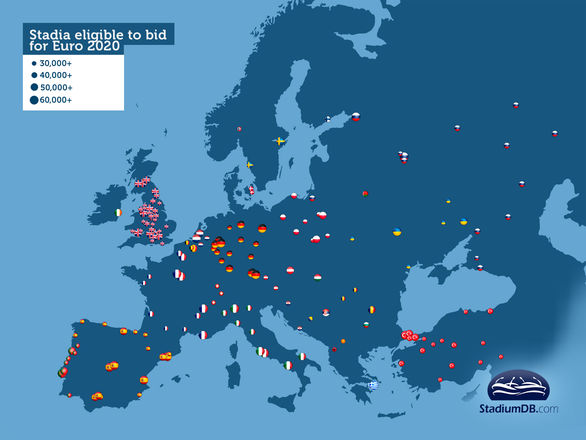Euro 2020: Meet all potential cities
source: StadiumDB.com; author: michał
 UEFA hasn't set any guidelines for Euro 2020 host-city selection yet. But should they follow the requirements used until 2016, it would mean a massive list of 177 stadiums throughout Europe could apply for the event.
UEFA hasn't set any guidelines for Euro 2020 host-city selection yet. But should they follow the requirements used until 2016, it would mean a massive list of 177 stadiums throughout Europe could apply for the event.
Advertisement
Emotions after yesterday's decision of the UEFA Executive Committee are still high and one question seems to be asked more often than any other – which cities could play host to the pan-European 2020 tournament?
Some speculations say that host stadia are to be selected along UEFA national team ranking, meaning top 10 or more countries might get a stadium for Euro 2020. Others say it will be mostly about national stadiums from all over the continent, which would mean Euro might overgrow World Cup for the first time ever. This sounds like temptation for UEFA, competing with FIFA for sponsors and media attention with their tournament.
Who can apply?
We decided not to play fortune-tellers with specific nominations. On the contrary, we aim to present how many various grounds all over Europe may hope for a game or two during the tournament. It's not easy as even Secretary General Gianni Infantino said yesterday that no requirements have been set so far.
"As far as the bidding process is concerned," said UEFA General Secretary Gianni Infantino, "this will be determined in the next couple of months by the UEFA National Team Competitions Committee, and then presented to the Executive Committee for ratification, most probably at its meeting in March 2013. It is premature to go into more details. What is clear is that it will not be in one or two countries, but in several cities in Europe. How many cities is still to be decided."
Our criteria
Having nothing solid about the future tournament, we decided to base upon current regulations set by UEFA to define standards as well as most recent tournament regulations – for the French Euro 2016.
And so, to cut long story short, stadia eligible to bid should have capacity of 30,000+ with most of the seats covered for group games, 40+ for quarter- or semifinals and 50+ for the final. Of course their chances may grow along with size and age, meaning we need to take into account ongoing construction works and designs approved of planned for upcoming years. As this is a very dynamic situation, please take into account that our list can only be considered as an estimate, not precise document covering all aspects of the specific stadium developments.
Potential candidates
As a result of the loose, but reasonable requirement we received a very long list of 177 stadiums throughout Europe (actually some lie in Asia). A list almost impossible to present in the text, so you may find it as a simplified map below.
Obviously, only 10-13 cities can be selected in the end (most probably in 2014) and it seems not all stadia have comparable chances. But if we're to believe UEFA's statements, the tournament is to become a chance for cities that couldn't get any Euro match in the current formula – like in the Balkans (countries too small to host the whole tournament even in joint bids).
What does the list show? Absolute domination of British stadia with 34 eligible in total (Scotland and Wales having 3 each), exactly double the number of Spain and... Turkey. This may seem surprising, but we need to keep in mind Turkish authorities have launched a national sports infrastructure program, partly hoping for Euro 2020. Meanwhile Germany's number (16 stadia) suffers from the standing room regulations which mean that for international games capacities fall significantly compared to domestic fixtures.
High numbers in Russia and France (13 and 12), but these numbers are high mostly to both countries hosting this kind of event directly before Euro 2020 – France got Euro 2016 and Russia 2018 World Cup. Will this hurt their cities' chances to get a Euro 2020 fixture? We have to wait for UEFA to see that.
Italy with its outdated stadiums seems under-represented on the map, but we need to keep in mind that to date there is no solid plan of any stadium over 30,000 to be built in next few years, with only AS Roma seemingly progressing with their vision. Poland grew strong over the years, just like Ukraine (9 and 6 eligible stadiums, respectively), which both countries owe to Euro 2012, of course.
Better chance or growing exclusion?
Theoretically, we should see Euro 2012 take place in several countries. Theoretically underprivileged cities are to be given new opportunities. But many fear the biggest opportunity will be given to those most powerful and richest – large clubs/cities of Western Europe, with most modern and largest venues, not mentioning other infrastructure.
This may be seen in the views of Football Supporters Europe, largest supporter network on the continent. FSE collected some 1,200 opinions during their consultation on the proposal and the outcome is a devastating rejection of the new formula (82% against). Logistics, identity and many other issues are still very much unclear, just as is the possible city selection. Will upcoming months convince supporters that the tournament is indeed a chance more than threat?
Map of all the venues in full size may be found at our facebook fanpage.
Advertisement
 StadiumDB
StadiumDB